Immigration justice
Posted on February 20, 2024, by Christina Manweller
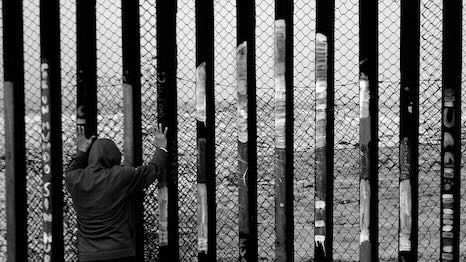
Photo courtesy of Max Böhme, Unsplash
For I was hungry and you gave me food, I was thirsty and you gave me something to drink, I was a stranger and you welcomed me, I was naked and you gave me clothing, I was sick and you took care of me, I was in prison and you visited me.
Matthew 25:35-36
In Matthew 25:35-36 Jesus tells us to “see in the migrant not simply a brother or sister in difficulty, but Christ himself, who knocks at our door,” Pope Francis has recently written. Migration, he says, is a human right.*
Loretto’s Latin America/Caribbean Committee (LACC) ministers to Christ knocking at the door, offering willing hearts and hands. LACC helps provide urgently needed help on the ground, supports migrant advocacy at the border, advocates for immigration justice and provides education about immigration realities and issues.
“We must be proximate, meaning close to people, be willing to move out of our comfort zone, change the narrative about immigrants to one of bravery and strength and remain hopeful in our justice work. I strive to be all of that as a friend and advocate for immigrants seeking lives of joy and safety in our country,” shares LACC member Maureen Flanigan CoL. She points to Bryan Stevenson, founder of the Equal Justice Initiative and author of “Just Mercy” as an inspiration for this work.
LACC members embrace Loretto’s deep commitment to work for justice and act for peace, serving as a source of hope for those whose hope is stretched thin. “We’re talking about people who are here because they are not secure where they’re from. Climate change means no food. Violence in their countries trickles down to violence in their own lives. Many arrive with nothing. If they had something it was probably taken along the way,” explains Mary Margaret Murphy SL who helps migrants in El Paso.
“In whatever place we decide to build our future, in the country of our birth or elsewhere, the important thing is that there always be a community ready to welcome, protect, promote and integrate everyone, without distinctions and without excluding anyone,” writes the pope.* Loretto has been doing just this throughout its history and continues to do so, as you will see in the following paragraphs.
*Read Pope Francis’s Sept. 2023 letter for the 109th World Day for Migrants and Refugees here.
Q: What would immigration justice look like?
Immigration justice in the U.S. would be furthered if the asylum rules and process already in place were observed, states Mary Jean Friel CoL, who began working with migrants as a young Loretto sister in the 1960s. Additionally, the U.S. Constitution and laws grant rights and liberties, including due process and equal protection, which in the migrant experience are often disregarded.
Since before recorded history humans have migrated in response to local conditions and changes in climate. The U.N.’s Universal Declaration of Human Rights of 1948 recognizes migration as a right. Pope Francis writes, “We are called to show maximum respect for the dignity of each migrant; this entails accompanying and managing waves of migration as best we can, constructing bridges and not walls, expanding channels for a safe and regular migration.” (Letter for the 109th World Day for Migrants and Refugees, Sept. 2023).
Along with Pope Francis, Loretto supports the rights and dignity of migrants, working and praying for immigration justice.
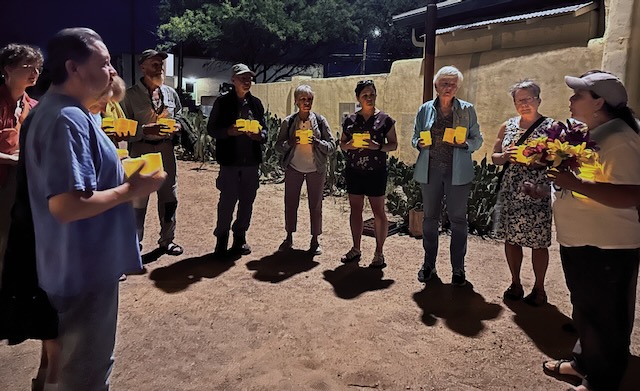
Photo courtesy of Stacy Fitzwater CoL
El Paso
Located about 10 miles from the U.S.-Mexico border in Texas, El Paso is on the front line of the U.S. immigration humanitarian crisis. For decades, Loretto members in El Paso have provided support to arriving migrants. In recent years, El Paso has experienced a sizable increase in numbers of arriving migrants, and Loretto members have continued to work hard to provide much-needed relief.
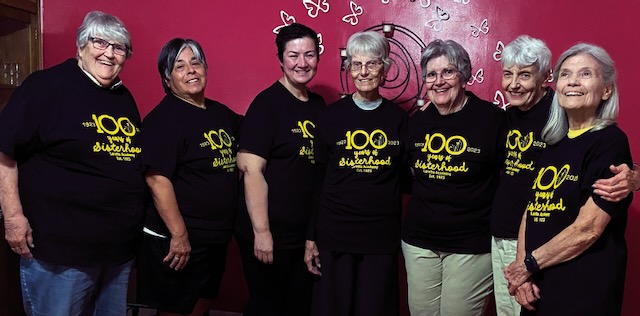
Photo courtesy of Liz Deines SL
Mary E. “Buffy” Boesen SL
“In December 2022 Sacred Heart Church opened their gym to the influx of migrants in order to provide food, shelter and showers. Many El Pasoans volunteered to make and serve food, gather blankets and transform the gym into a hospitality center. Jane German CoL, Irma Avila SL and I went down.
“As the shelter grew, we decided to volunteer to wash towels (there were hundreds). As time went on the American Red Cross donated many blankets made from recycled plastic bottles. The numbers of asylum seekers grew and so did our laundry duties. Kathleen Corbett SL joined us. As time went on, we were joined by others from St. Thomas Aquinas, our parish, and for shorter periods by sisters in other congregations.
“The number of blankets and towels varies. Some days there are 20 loads for the 60- and 80-pound washers, and other days up to 40 loads. Many days clothes from the asylum seekers get thrown in too. We can spend between $100 and $250 on a wash day. Many Loretto members, friends and even strangers have given us funds — either directly or through Loretto’s development office. Gifts have ranged from $5 to several hundred. I have never been afraid to ask for funds for a good cause. We have received substantial gifts from the owner of the laundromat.”
Jackie Diego-Medina CoL
“The physical aspects of being a volunteer are immense, as there is always something to do, and that has been easy for me; what has been hard is to see the fear in the eyes of immigrants when they first arrive. That fear comes from hardships in their mother countries, the journey to reach the U.S. and the fear that they will be deported. The fear is also seen in the smallest of children who have lived the same hardship as their parents. Welcoming the immigrants, offering them assistance and giving them a sense of safety has taken away that fear in their eyes and has turned it to hope and gratitude. I pray, I love, I volunteer.”
Kathleen Corbett SL
“When volunteers staffing Casa Papa Francisco, a temporary shelter secured by Ruben Garcia to accommodate about 20 people, call me for transportation to the airport or one of four downtown bus stations, I am happy to be able to drive them so that they can leave for other parts of the country where they have family or friends who are sponsoring them as they wait for their court dates. Some have just celebrated their 18th birthdays and so have aged out of detention. Others seeking asylum have qualified for a hearing and are ready for the next step. Many are from Guatemala or Honduras; a few are from Ecuador or El Salvador; others are from Venezuela, Cuba, Colombia, or occasionally Mexico or Peru.
“The mornings of Monday, Wednesday and Friday I go with the other Loretto members to a laundromat that has big heavy-duty washers and dryers to wash and dry, fold and pack up towels and blankets that Irma, Buffy and Jane have picked up the evening before from Sacred Heart Parish near the border where many immigrants spend the night. We do this work along with other volunteers who have been recruited by Buffy and Jane.”
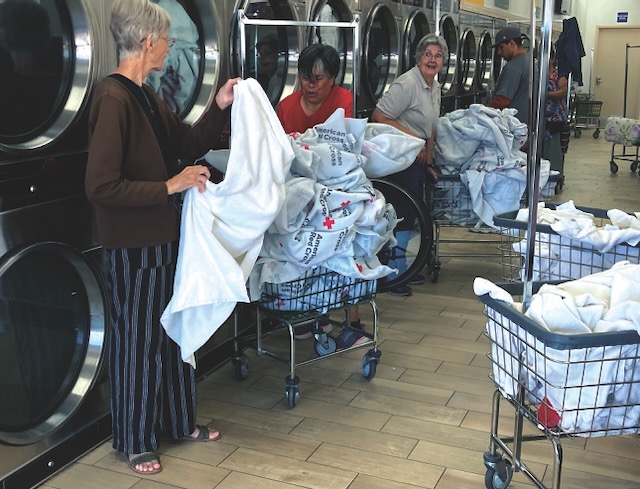
Photo by Mary E. “Buffy” Boesen SL
The work gets done in El Paso …
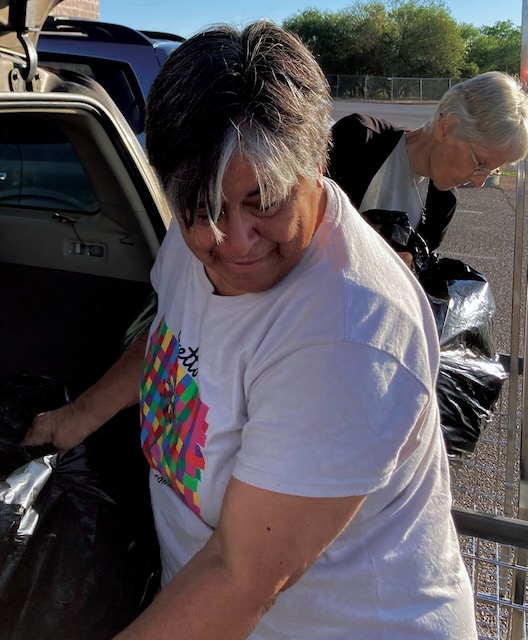
Photo by Mary E. “Buffy” Boesen SL
Irma Avila SL has translated for individuals completing paperwork to apply for asylum. Most recently she is helping widows of U.S. citizens who are required to spend a month or two at different times of the year in EL Paso in order to receive widows’ benefits. She also participates in laundry days.
Mary E. “Buffy” Boesen SL has volunteered helping migrants for many years; she is currently a member of the Loretto laundry team.
Kathleen Corbett SL drives migrants to the airport or a bus station when asked. She also is a member of the Loretto laundry team.
Liz Deines SL supports migrants with her prayers.
Jackie Diego-Medina CoL and Mary Margaret Murphy SL each spend a day a week volunteering at an Annunciation House hospitality center. They prepare meals, organize, clean, accompany women and children to doctor appointments or to the hospital in emergencies. They say no two hours are the same.
Terry Franco CoL helps with laundry as she is able.
Jane German CoL helps with laundry and prays for the safety of the migrants and for just immigration laws.
Helen Santamaria SL has been driving immigrants to the airport and bus stations since 2014.
I pray, I love, I volunteer.
Jackie Diego-Medina CoL
Q: What are the causes of migration?
Migration is commonly the result of war, natural disasters or poverty. Crime, inequality, corruption and governmental instability also result in untenable living conditions, driving desperate citizens to seek safety and improved conditions. Weather shocks and environmental degradation, often leading to floods and desertification, are now forcing farmers off their land. At the end of 2022 there were 35 million migrants worldwide who had been displaced from their homelands, another 5 million asylum seekers and 63 million internally-displaced persons. Imagine being forced to flee your community, your country and all that you have known to undertake a perilous journey to an unfamiliar country, taking only what you can carry.
The needs are great and our hearts are full as we work together to honor the worth and dignity of every person.
Maureeen Flanigan CoL
Denver
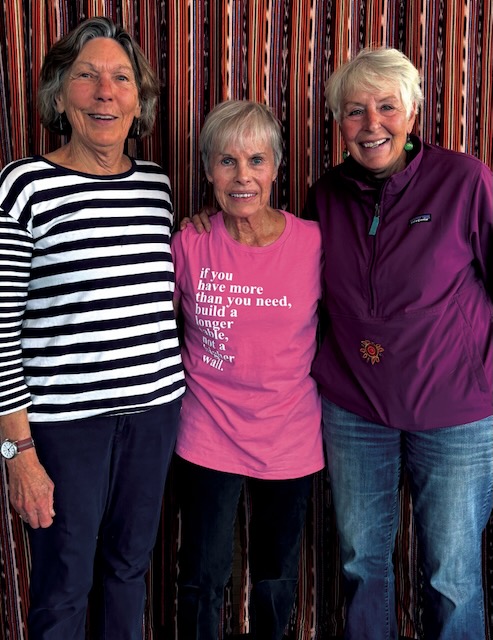
Photo courtesy of Mary Helen Sandoval CoL
Between late 2022 and fall of 2023, 25,000 migrants were served in Denver, staying in temporary shelters before being forced to survive on the streets or travel to another city. As conditions have deteriorated in Latin America in recent years, many have fled unsafe and untenable conditions, often crossing the border into Texas. The state of Texas has bused many of these migrants to other states, including Colorado.
A significant percentage of recent migrants is made up of Venezuelans fleeing unstable conditions, violence and economic hardship at home. In recent years more than 7 million people have fled the country. Nearly 55,000 Venezuelans arrived at the U.S. border with Mexico in September 2023 alone. LACC members in Colorado provide welcome and assistance, partnering with local organizations.
Working for justice in Denver
“The Latin America/Caribbean Committee in Colorado is small but mighty,” says Maureen Flanigan CoL. “There are so many opportunities to be in relationship with our immigrant families in Colorado. The needs are great and our hearts are full as we work together to honor the worth and dignity of every person.
“We are so grateful to the agencies, staffs and volunteers providing resources in our area.”
LACC in Denver is committed to continuing partnerships with local organizations including:
Casa de Paz, founded in 2012, provides safe temporary shelter and help to those released from the Immigration and Customs Enforcement detention jail in Aurora, Colo., as they seek safety and fight their cases. Casa de Paz has welcomed over 10,000 guests from 80 countries.
Coloradans for Immigrant Rights (CFIR) is an organization that Loretto Community members in Colorado partner with to form and maintain relationships with federal and local politicians and advocate with immigrants on their cases and on legislation, accompanying people to their immigration hearings, participating in vigils, rallies and marches, joining family celebrations when cases go well and being present when they don’t.
St. Mary’s Academy (SMA) is located in the Denver area. LACC members in Colorado engage with students and teachers by speaking at SMA events. The SMA staff have participated in and contributed to LACC border trips.
Border trips
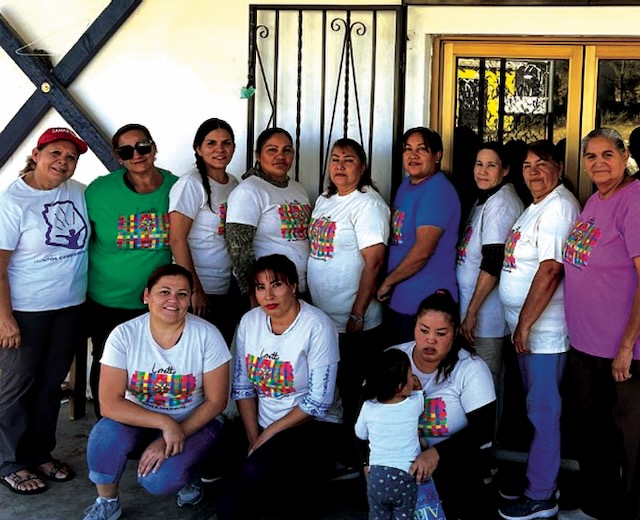
Photo by Dora Rodriguez
Maureen Flanigan CoL
“Our border trips are an opportunity to be immersed in Loretto and LACC values of witness, hope and friendship in humanitarian service. On these trips we offer monetary donations, supplies and clothing. What we gain is hearing the migrants share their stories of heartbreak, courage and strength. We bring their stories home to our communities to stir consciences and build friendships in our communities, encouraging efforts for legislative action and immigration reform.”
Mexico
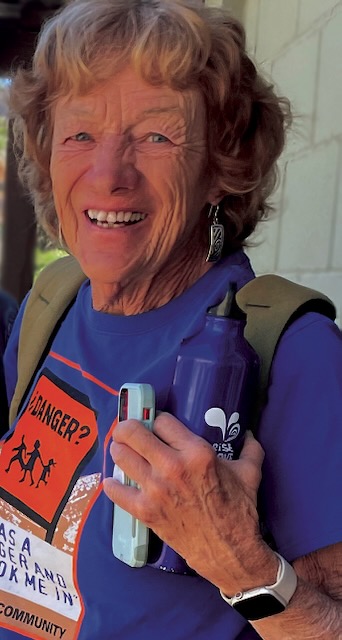
each week to volunteer with migrants
at shelters.
Photo courtesy of Mary Jean Friel CoL
Loretto works with organizations in Mexico to provide food and humanitarian assistance to migrants. Mary Jean Friel CoL volunteers weekly at two shelters in Tijuana and visits others every couple of months. Other Loretto members visit the shelters when Loretto hosts border trips. Loretto also works with Bob Kee, friend of the Community and member of the Tucson Samaritans, who delivers water and food to the desert to help save lives. Bob is also a medic, and is able to provide medical assistance.
Organizations Loretto partners with near the border include:
Casa de Arcoiris (“Rainbow House”), a grassroots organization in Tijuana supporting LGBTQI+ migrants in search of asylum in the United States or refuge in Mexico. Casa Arcoiris operates a shelter and provides humanitarian services, access to legal services, healthcare and counseling in collaboration with local and international organizations.
Espacio Migrante, a shelter and community center housing 40 migrants in Tijuana. Those served include Afghans, Africans and Haitians who wait in Tijuana for decisions on their asylum applications. Loretto helps purchase vouchers that can be used for essentials, including food, diapers and tents.
Kino Border Initiative, a faith-based group that strives to respond to the critical needs of migrants in Nogales. They provide two meals a day, medical support, personal care items and clothing.
Salvavision, an organization in Tucson, Ariz., primarily working in Sasabe, Sonora. Loretto has helped local women who assist migrants seeking asylum in the U.S. There are many children in Sasabe, and Loretto hopes to help start a library.
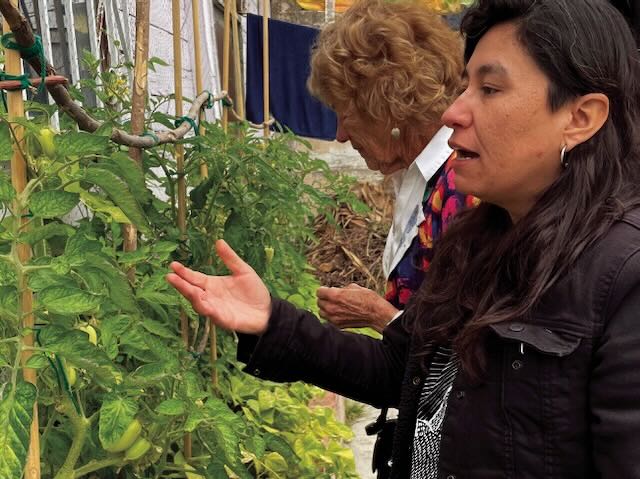
Photo by Rosa Lizarde CoL
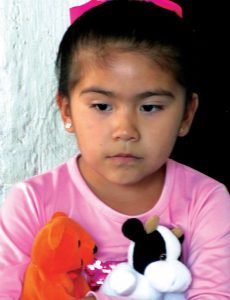
Photo courtesy of Mary Jean Friel CoL
Q: How can we help?
Start by visiting Loretto’s immigration justice webpage where you will learn more about the work being done and how to stay informed.
Once there, you can also click on the red donate button (upper right) to help further this important ministry.
Keep up-to-date about what is going on that affects migrants personally and politically. Act when you can, and pray for all migrants everywhere, that they may find safety and welcome.
To read all the articles in the Winter 2024 issue of Loretto Magazine, click here.
